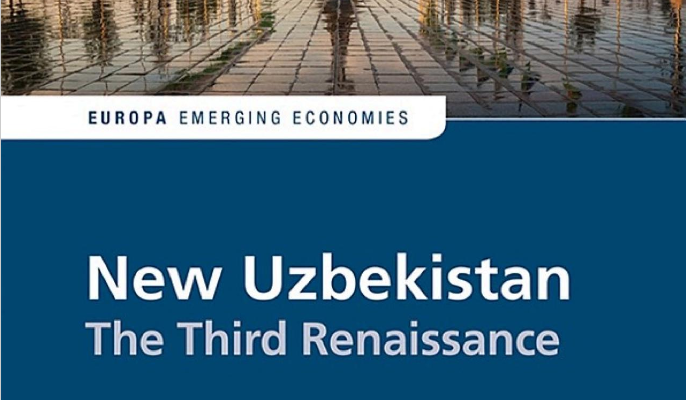In New Uzbekistan: The Third Resistance, edited by Bakhrom Mirkasimov and Richard Pomfret, examines the post-2016 economic transformation against the backdrop of a range of significant external changes, including the COVID-19 pandemic and the Russia-Ukraine war. The editors have employed a collaborative approach, pairing international experts with Uzbekistan-based co-authors, which enriches the book’s perspectives. This results in an engaging and insightful volume.
Bakhrom Mirkasimov and Richard Pomfret launched their book at the University of Westminster in May 2024.
Mirkasimov, B. and Pomfret, R. eds., 2024. New Uzbekistan: The Third Renaissance. Taylor & Francis.
Are the ambitions of Uzbekistan to become an upper-middle-income country by 2030 realistic? Will agriculture remain one of the rural population’s primary employment sources? Will Uzbekistan’s WTO membership be the next big step in opening up?
The first two chapters take the reader through the macroeconomic and development issues facing Uzbekistan. The 2030 ambition to become an upper-middle-income country would require almost 10% annual GDP growth. This is a significant increase on the average of 5.5% growth over 2018-2022. To achieve this, a series of policy measures will need to target job creation, state-owned enterprise (SOE) reforms, foreign investment in labour-intensive industries and increased transport and digital connectivity with other countries in the region. Despite these challenges, the macroeconomic picture has shown signs of significant improvement. There have been large drops in inflation, from 20% to 12% over 2017-2022, and a raft of reforms of the exchange rate, trade regime and foreign exchange, and movement towards a more independent central bank.
The later chapters in the book look into specific sectors, starting with healthcare. The experience of Uzbekistan stands out positively compared to most post-Soviet states. Early reforms of the Soviet system were relatively easily realised. The major challenges remain, including health care in the poorest regions in Uzbekistan.
“With the easy gains largely realized, the Mirziyoyev Administration has embarked on a hugely ambitious set of health sector reforms.” (p. 77)
Turning to the financial system, state-owned banks continue to dominate the banking system. However, the focus has shifted from supporting SOEs to providing services for private institutions. Challenges around providing financial consumer protection and market oversight remain on the agenda.
“By the end of 2018, state-owned commercial banks (SOCBs) still dominated the banking sector of Uzbekistan, accounting for more than 95 per cent of the total sector assets.” (p. 81)
The agricultural sector reforms have aimed to improve competitiveness and raise production. Government-set output targets for cotton and wheat have been abolished alongside price and export liberalisation. However, the pandemic and the Russia-Ukraine war have brought higher prices and reduced access to food for low-income households. Moreover, reforms have not been fully implemented in some areas, with the state retaining considerable control over the sector. For example, farmers sell to one buyer selected by the government. Also, weak property rights remain a challenge to allowing the rural population fair access to land.
“Farmers have little control over the crops they cultivate or the inputs they use.” (p. 129)
The book also highlights Uzbekistan’s broader pivot to the world stage, noting its efforts to reduce trade barriers and improve regional and international connectivity. Uzbekistan’s push to join the WTO is an important step in integrating into the global economy. However, both the pandemic and the ongoing conflict in Ukraine have slowed this process.
“A more permanent benefit for Uzbekistan is the search by the EU, China and others for new trans-Eurasian transport links that are not dependent on Russia.” (p.179)
Despite the setbacks, the book is ultimately optimistic about Uzbekistan’s trajectory. The ongoing reforms, while complicated by external shocks, signal a path of gradual but meaningful progress. New Uzbekistan: The Third Renaissance is a thought-provoking and valuable contribution to the literature on Uzbekistan’s transformation, offering an in-depth look at the country’s economic challenges and opportunities.
Author of the review
Dr Karen Jackson is a Reader in Economics at the University of Westminster and Deputy Director of the Forum for Uzbek and Silk Road Studies.
